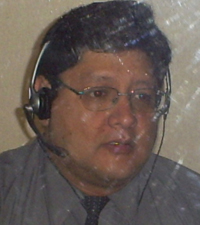Vanessa Marques wrote:
Translation trouble at top-level talks
By James Robbins
BBC diplomatic correspondent
What does it take to translate for a president or a prime minister? Can an interpreter's slip change the course of history? In Breaking The Language Barrier, some of the great interpreters talk of their experiences with US, UK and Soviet leaders - and confess that they sometimes tone down the language of their political masters.
Welcome to the world of interpreters - of linguistic high-wire acts and rapid-fire translation raised to an art form.
Interpreters are those almost invisible but quite indispensable people squeezed between two rival presidents, neither of whom speaks the other's language.
The interpreter's task is simple - render the flattery or the threats, the soft sell or the hardline of their masters into another tongue.
So how much does get lost in translation? And how do interpreters do it anyway, for heaven's sake, when most of us have trouble communicating in our own language half the time?
I have watched and listened to some of the greats in the interpreting business - at summits, at war crimes trials, at the United Nations or the European Parliament - as they play the parts of presidents and princes, prosecutors or parliamentarians.
Have there been any really big mistakes? Has the course of history been changed by the interpreter missing out that vital word "not" and turning a concession into a threat?
Well, even the stars of the profession make occasional slips.
Treaty tussle
Igor Korchilov, who translated for Soviet leaders from Khrushchev to Gorbachev, was at the very top of his interpreting career at a summit between George Bush senior and Mikhail Gorbachev as the Cold War was ending in the late 1980s.
"The two Presidents and their respective delegations were discussing the arcane biz of arms control," he says.
"Things like SDI, ABM, Mervs, all those Slicom, Glicoms, and other such hi-tech Star Wars stuff including the so-called open-skies proposal, which was the brainchild of the American delegation at the time."
The stumbling block was to reach agreement on whose aircraft should be used to over fly the other side's territory for inspection purposes, to verify compliance with the arms control treaties about to be concluded.
The Soviet Union wanted one set of rules - the Americans precisely the opposite.
The argument came down to two horribly similar words: verifying and verified.
"Gorbachev, in presenting his position, did not pronounce very clearly or distinctly the ending of one of these two terms, which were crucial in the context," Mr Korchilov explains.
"He said a word in Russian which I heard as verifying party - and of course that was a total reversal of the Soviet position.
"Baker and Bush were incredulous. They looked at me and they were kind of happy that Gorbachev had changed his position overnight to go along with their proposal.
"But just to make sure, they asked Gorbachev to repeat, to corroborate, to confirm what he had just said.
"Well, when I translated it back into Russian, Gorbachev said, 'No, no, I did not say that. I said it's up to the verified party to provide the aircraft' - not to the verifying party as I translated.
"Of course, after the meeting, I came up to Bush to apologise. He heard me out very carefully, he nodded gravely as if to emphasise how bad the mistake was, and said, 'Well, that's the bad news'.
"Then he patted me in a friendly fashion on the shoulder and said, 'But don't worry, the good news is you didn't start World War Three'."
Forceful language
Mistakes are inevitable. They are not usually as serious as that one - and it was spotted, of course.
So it is hard to find evidence of history actually being changed by an interpreter's slip, but that certainly does not mean their influence is not powerful.
Their performance and style can change the whole mood of a meeting.
But then, what about the poor interpreter unable to bring himself to be as blunt as the speaker - the interpreter convinced he must tone down the harshness of a political master?
No surprise, perhaps, that Margaret Thatcher could stun interpreters with her forceful language.
Her foreign policy adviser, Charles Powell, remembers a tense meeting.
"Sometimes interpreters really do have to censor things a bit," he says.
"Once, the Foreign Office plagued 10 Downing Street, back in the mid-1980s, for Mrs Thatcher to see the visiting president of the former French Congo - a well known Marxist and Communist.
"Mrs Thatcher was reluctant to see him but, after much nagging, she finally consented.
"The President arrived and was shown up to her drawing room and sat down opposite her, and she leant across, fixed him with a baleful glare and said, 'I hate Communists'.
"The poor French interpreter, rather shattered by this not exactly courteous introduction to the conversation, rendered it something like 'Prime Minister Thatcher says that she has never been wholly supportive of the ideas of Karl Marx', which I thought was a pretty brave attempt in the circumstances."
"Breaking the Language Barrier" is written and presented by James Robbins. The producer is Philippa Goodrich. It was broadcast on BBC Radio 4 on Saturday, 24 January, 2004.
Story from BBC NEWS:
http://news.bbc.co.uk/go/pr/fr/-/1/hi/uk/3426257.stm Published: 2004/01/24 16:32:22 GMT
© BBC MMIV







